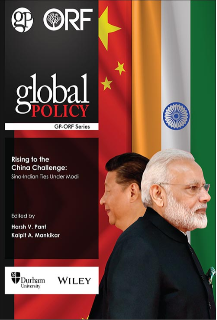 This article is part of the series—Raisina Edit 2022
This article is part of the series—Raisina Edit 2022
There has been much debate over the years about the likelihood of a ‘splinternet’ and so-called ‘balkanization’ or fragmentation of the global Internet. A key concern has been that the “open, globally connected Internet we all use splinters into a collection of fragmented networks controlled by governments or corporations”. In fact, several countries, such as China, Iran, and Russia, have previously taken steps in this direction, albeit not completely disconnecting from the global Internet.
Prior to the war in Ukraine, Russia and China were, for instance, already negotiating for a “new, top-down internet protocol that would give internet providers the ability to block any website or app”, raising concerns that ambitions could lead to an Internet of different networks divided along national borders, where governments could control imported Internet content. China is particularly noteworthy in this case—many online services in China are now valuable Chinese Internet companies and the country has become known for its online censorship (otherwise known as the ‘Great Firewall of China’), arguably allowing it to disconnect from the global Internet should it so desire. While there is a current sense that China will continue to rely on the global Internet, it is increasingly in a position where it can cut itself off when faced with a large enough crisis but, in the meantime, prefers to allow diaspora access to connections at home and businesses to continue selling products overseas, while working to develop international internet governance rules that suits its needs. Iran, too, is recognised as having the ability to operate through an Iran-only Internet if it needs to disconnect from the global network or, notably, if it were “kicked off by an adversary”.
A key reason for why such splintering has not yet comprehensively come about is mainly states’ strategic self-interest to remain connected, while working to nudge the status quo to suit their ambitions.
To a different degree, even in 2020 in the midst of the ongoing so-called ‘tech wars’, the Trump administration in the U.S. was accused of worsening the risk of splintering along regional and political lines, after announcing bans on Chinese apps for security reasons. It was argued then that this would potentially invite retaliation and a “blueprint for authoritarians,” where there were already indications of increasing division between the U.S., Russia, China, and the European Union (EU). The U.S. was even accused of being the greatest threat to the global free flow of information, otherwise known as America’s Grand Cyber Canyon.
Nevertheless, an entire splintering beyond countries using different platforms on the same architecture has not come about yet, and could apparently only really occur through means such as: a technically incompatible protocol used by a large number of the world’s population; or different governing bodies. A key reason for why such splintering has not yet comprehensively come about is mainly states’ strategic self-interest to remain connected, while working to nudge the status quo to suit their ambitions.
Pull Factors for Russia: Temporary or Permanent Strategic Disconnection?
Not too dissimilarly, Russia has made significant efforts in recent years to bring about enhanced control of its online sphere, having enacted its ‘sovereign internet’ law in 2019 and testing of the so-called RuNet to allow the country’s disconnection from the global Internet when required. Nonetheless, experts surmise that the Russian Federation’s ability to achieve these goals on its own terms still requires more time and investment. In the meantime, while the country was already known for its control over state-run media, it has tolerated a degree of access and connection to global online content and services, while also continuing to rely on global services such as social media and financial gateways.
Recent articles flag concerns about more game-changing splits - given that Russia is said to be withdrawing from international governance bodies, experts worry that there would be ‘seismic’ consequences if this occurs with the Internet’s governing bodies.
In the wake of the Ukraine invasion though, Russia has taken additional steps to reduce access to Western services and information providers to control the information sphere, alongside introducing stricter censorship on local media organisations, and legislation to criminalise distribution of unfavourable content. These voluntary moves are arguably drawing the country ever closer to Internet fragmentation. Russian citizens’ access to online services such as Facebook, Twitter, and Instagram has been limited in the past few weeks. The Government is also said to be directing businesses to move their web hosting and business services to Russian servers (even though there is scepticism about whether Russia currently has the capacity and capability to achieve this on a national scale). Recent articles flag concerns about more game-changing splits - given that Russia is said to be withdrawing from international governance bodies, experts worry that there would be ‘seismic’ consequences if this occurs with the Internet’s governing bodies.
In short, these voluntary steps to more severely disconnect, and questions surrounding the future of global Internet governance might bring about Russia’s digital isolation in a manner that it was not yet prepared for. This is despite the country’s recent prepositioning for strategic disconnection in times of domestic crises or adversarial tension, and its need to create freedom of manoeuvre in its strategic decision-making.
Push Factors to Bring About Russia’s Digital Isolation as a Pariah State: Driving Short and Long Term ‘Splintering’?
Countries are said to be intensifying the most severe sanctions ever levied on a major economy, with the intention to send Russia into economic, financial, and technological isolation. Several measures that continue to be taken by governments and corporations globally since the initial invasion of Ukraine are pushing Russia towards digital isolation. One such example is tech sanctions that introduce export controls to technologies that are required to bring about infrastructural changes. Other government activities in the spotlight include the EU and others introducing bans on Russian outlets from the Internet, such as blocking sites and ensuring search engines and social networks delete repeating content.
The very proposal by Ukraine for these sanctions would likely indicate to countries such as Russia (and others) that they should ideally develop counter-measures for future scenarios in the eventuality that such sanctions might ever be implemented.
One of the most prominent proposals is the request by the Ukrainian Ministry of Digital Transformation in February 2022 to the Internet Corporation for Assigned Names and Numbers (ICANN) to impose Internet governance sanctions against Russia. While ICANN (and RIPE) replied in the negative, a group of multistakeholder governance experts subsequently attempted to address a newly apparent major governance gap by issuing recommendations in March 2022 on principles of Internet governance. Their proposal includes other possible Internet sanctions that they argue would be more effective and precise and carry fewer risks and lower costs, as well as a proposal for the formation of a new multistakeholder mechanism to publish sanctioned IP addresses and domain names. The invasion of Ukraine has brought about a new challenge for multistakeholder Internet infrastructure governance, with open questions surrounding appropriate sanctions and their consequences, as well as an associated governance mechanism.
This matters because, as the March recommendations note, these Ukrainian proposed sanctions might otherwise drive countries to pre-emptively implement relevant cyber defence measures that would likely bring about splits by, for example, reducing dependence on foreign nameservers for domain name resolution or setting up alternate roots competing with those already administered. It is particularly concerning though that while this governance challenge will clearly require resolving—to avoid unintended long-term consequences—it might not be enough to prevent a change in states’ calculus for future strategic planning purposes. The very proposal by Ukraine for these sanctions would likely indicate to countries such as Russia (and others) that they should ideally develop counter-measures for future scenarios in the eventuality that such sanctions might ever be implemented.
Other activities that are pushing varying degrees of splintering include the voluntary withdrawal from Russia of many Internet and tech companies, and those with technology underpinning the functioning of the Internet. Financial services such as Apple Pay and Google Pay, and credit card providers are pulling out, impacting e-commerce, and there are concerns about the near-term availability of cloud storage as well. Moreover, private companies’ moves are being disputed as potentially disproportionate, given the likely impact on the Russian population’s access to information and risk of alienation. For instance, many Russians cannot pay for private networking apps to get around government censorship of sites, after major credit card providers ceased operations in Russia, while major U.S. tech companies like Microsoft and Oracle have stopped selling software there too. Experts further note that Russia might need to look to China to buy software and hardware products if it is cut off from U.S. and European products for too long, and possibly seek physical connections for its Internet traffic if neighbouring countries or non-Russian companies refuse traffic running through fibre optic cables (thus challenging prior perceptions of their apolitical nature). And less discussed are the longer-term ramifications of the mass departure of professionals in the tech community from Russia and relocation of Russian tech companies’ employees.
Beyond the Ukraine War: Invitation to Splinter Globally?
The degree and permanence of Russia’s pariah state status and digital exclusion remains to be seen. While Russia’s measures and that of other state and non-state actors are coming about at great speed on account of the current conflict, it remains to be seen whether a country that becomes so digitally excluded in practical terms can ever return to pre-Ukraine invasion levels of connection. The combination of sanctions, companies’ voluntary withdrawals, and Russia’s own measures will raise new questions as to whether Russia’s digital isolation will cause temporary or more permanent change to the nature of the global Internet. Moreover, the likely scars in Europe, Russia, and globally caused by this conflict might end up running too deep to encourage a return to prior interconnection and interdependence any time soon. Instead, there might be a preference for self-reliance for some time. Whether this comes about voluntarily or through imposed means may not matter at that point.
The combination of sanctions, companies’ voluntary withdrawals, and Russia’s own measures will raise new questions as to whether Russia’s digital isolation will cause temporary or more permanent change to the nature of the global Internet.
Meanwhile globally, it does not seem highly likely that an entire split from the global Internet will be the most favoured option for most countries acting out of their own strategic self-interest in the near term. It will continue to be in states’ interests to allow access to connections and to gain from global e-commerce.
Notably though, trendlines already indicate a desire among some countries to exercise more control over their domestic information environment, combined with reform of international Internet governance rules (including the now unresolved questions surrounding sanctions during time of conflict). The combination of both self-imposed and inflicted measures during this conflict will bring about a further watershed moment in global thinking. Although countries like China, Russia, and Iran were previously maturing their ability to disconnect from the global network when desirable, the Ukraine war will likely be a wake-up call for many other states. For strategic planning purposes, it is now likely that there will be even more appetite to create strategic fail-safe options to completely disconnect from the global network should domestic crisis or adversarial activity come about. To create this option and reduce such dependence on the global ecosystem, states would then be required to dedicate time and investment into national structures to bring about tech and Internet self-sufficiency. In sum, this might further exacerbate pre-existing global trends towards technological decoupling, techno-nationalism, and investment into domestic substitutes that were already apparent before the Ukraine invasion.
The views expressed above belong to the author(s). ORF research and analyses now available on Telegram! Click here to access our curated content — blogs, longforms and interviews.



 This article is part of the series—
This article is part of the series— PREV
PREV


